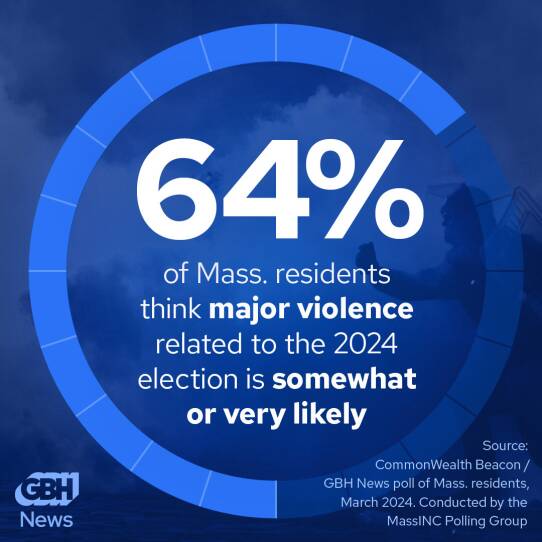Massachusetts residents are deeply concerned about political tensions and the prospect of violence as the 2024 presidential election approaches, according to a new GBH News/CommonWealth Beacon poll conducted by the MassINC Polling Group.
The online survey was conducted shortly after Donald Trump and Joe Biden both clinched the number of delegates to become their parties' presumptive nominees. Results from the poll (toplines, crosstabs) show 72% of respondents said political tensions in the United States are either very bad or constitute a crisis, while 64% said it’s either somewhat or very likely that the U.S. will see major violence in relation to the presidential election.
Steve Koczela, the president of the MassINC Polling Group, said the findings indicate that anxiety about the current political moment cuts across different segments of the Massachusetts populace.
“The thing that really sticks out to me is just the number of demographic groups where this is a majority,” Koczela said. “There’s really not anybody who thinks everything is going great right now.”
Still, Koczela noted, concern is somewhat more acute among certain subgroups. For example, while 76% of white respondents said political tensions were very bad or constitute a crisis, just 49% of Black respondents did. In addition, 68% of Asian residents and 60% of Latino residents shared that assessment.
There was more parity along racial and ethnic lines when it came to anticipating major violence in connection with the presidential election, with 66% of white residents, 62% of Black and Latino residents, and 50% of Asian residents calling it very or somewhat likely.
Responses to that same question varied according to political identity, though. A total 70% of Democrats and Democratic-leaning unenrolled voters called major violence somewhat or very likely, compared to 58% of Republicans and Republican-leaning residents. Among independents, that view was shared by 61% of respondents.
The poll was conducted from March 21 to March 29 among 1,002 Massachusetts residents. It has a margin of error of 3.4 percentage points.

The poll did not ask respondents if they believed political violence is sometimes justified. However, Koczela pointed out that, in a recent PBS NewsHour/NPR/Marist survey, one in five U.S. adults said Americans might need to use political violence to get the country back on track. That view was endorsed by 12% of Democrats, 18% of independents, and 28% of Republicans.
Juliette Kayyem, who served as Homeland Security advisor to former Massachusetts Gov. Deval Patrick, said the GBH News/CommonWealth Beacon poll conducted by the MassINC Polling Group reflects an "unprecedented" level of pessimism about the nation's civic health.
“All but 7% of respondents believe that the tensions are [somewhat] bad, very bad, or at crisis,” said Kayyem, who also served as former President Barack Obama’s assistant secretary for intergovernmental affairs at the Department of Homeland Security. “That’s a number I’ve never seen before, in terms of … the lack of hope that we can try to bridge our differences through the democratic process.”
Kayyem said that, in the presidential race, there’s a clear asymmetry between the two leading candidates when it comes to the endorsement of political violence as acceptable. She noted that Trump has warned of a “bloodbath” if Biden wins in November, and recently shared a video of a pickup truck with an image of Biden hog-tied on its rear gate.
“We can try to both-sides the issue: ‘Oh well, there’s Antifa on the Left,’” Kayyem said “But the reality is that one candidate, Donald Trump, is nurturing violence or the threat of violence as part of a campaign strategy. And that is having consequences on how the public perceives what’s ahead.”
Kayyem argued that Biden should be taking concrete steps to guard against the prospect of election-related violence, an argument she also makes in a newly published piece in the Atlantic.
“There are actually things that can be done now, in terms of the sharing of intelligence, designating the election a special national security event, getting the courthouses ready and protected,” Kayyem said. “We need to take the threat seriously and not be afraid of the politics of taking it seriously … I want to see lots more activity by the White House as the protector of the Constitution, as the guarantor of free and fair elections.”
The Boston branch of the Federal Bureau of Investigation declined to comment on the poll’s findings, but a spokesperson provided a statement saying the bureau is already engaged in “extensive preparations” to guarantee that the election will be secure.
“The FBI has a responsibility to plan for a host of potential scenarios related to election fraud, voter suppression, foreign malign influence, malicious cyber activity against election infrastructure, and threats to election workers,” the spokesperson said, adding that members of the public should “remain vigilant” and “immediately report any suspicious activity to law enforcement.”
Some research has shown that fear can depress electoral turnout. But Marisol Santiago, the policy and organizing director of the voter advocacy group MassVOTE, says she doesn’t think concerns about political tensions and violence will keep the people she works with from heading to the polls in November.
In fact, Santiago says, a different set of concerns predominates in the conversations she has with the electorate.
“What I am hearing is concerns about housing insecurity,” Santiago said. “I’m hearing concerns about healthcare, and wanting to make sure that families can stay where they live ... and that resources are being provided to historically marginalized communities.
“Here in Massachusetts, you should feel confident to walk into your polling location [and] cast your ballot,” Santiago said. “That is our right ... We will continue to organize in the ways that we have in the past to make sure that our communities are casting their ballots, and that they are accessing their ballots in their polling locations with no problem whatsoever.”
Editor's note: Juliette Kayyem is a member of the board of MassINC, the nonpartisan public policy think tank that publishes CommonWealth Beacon.








